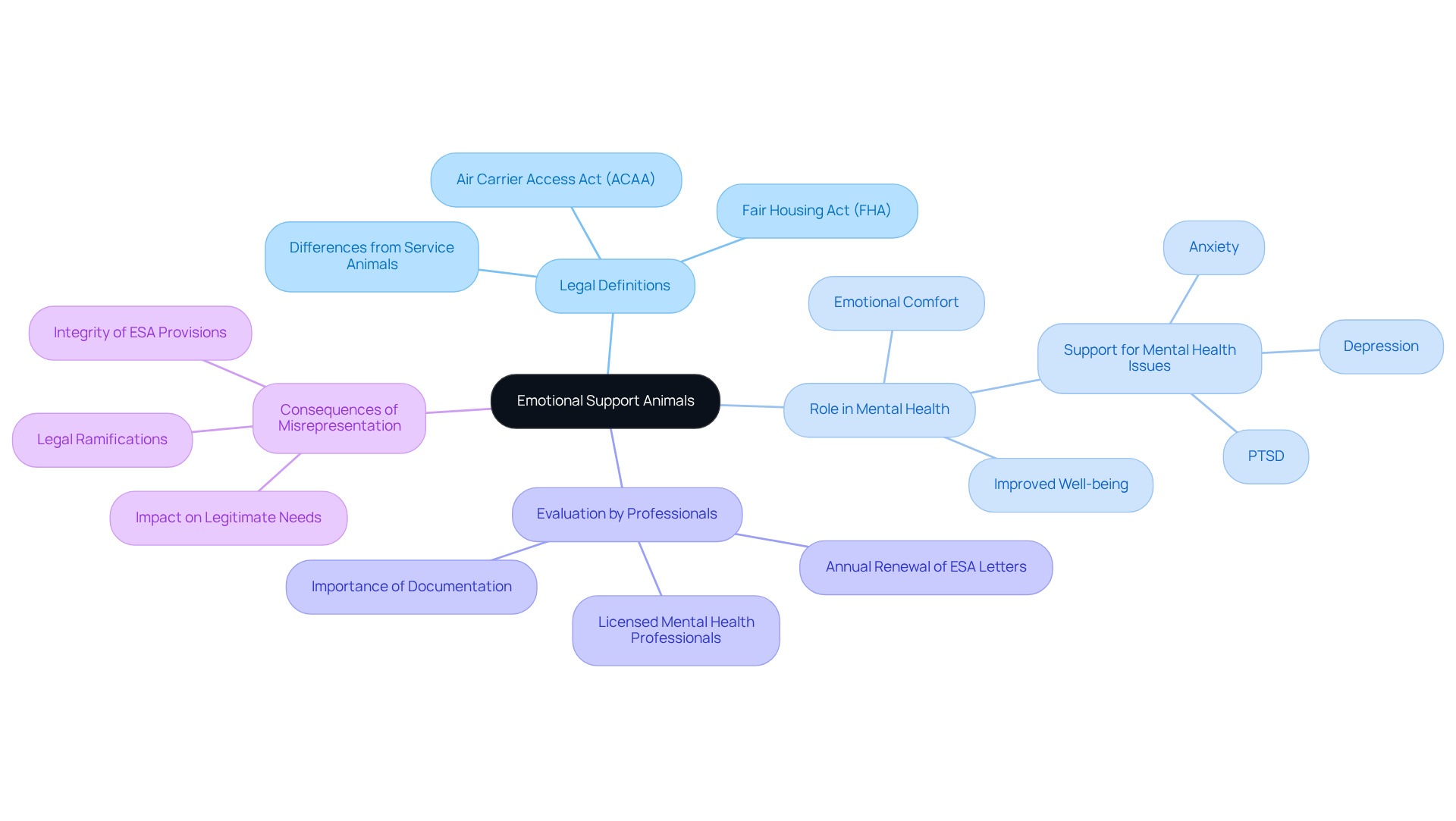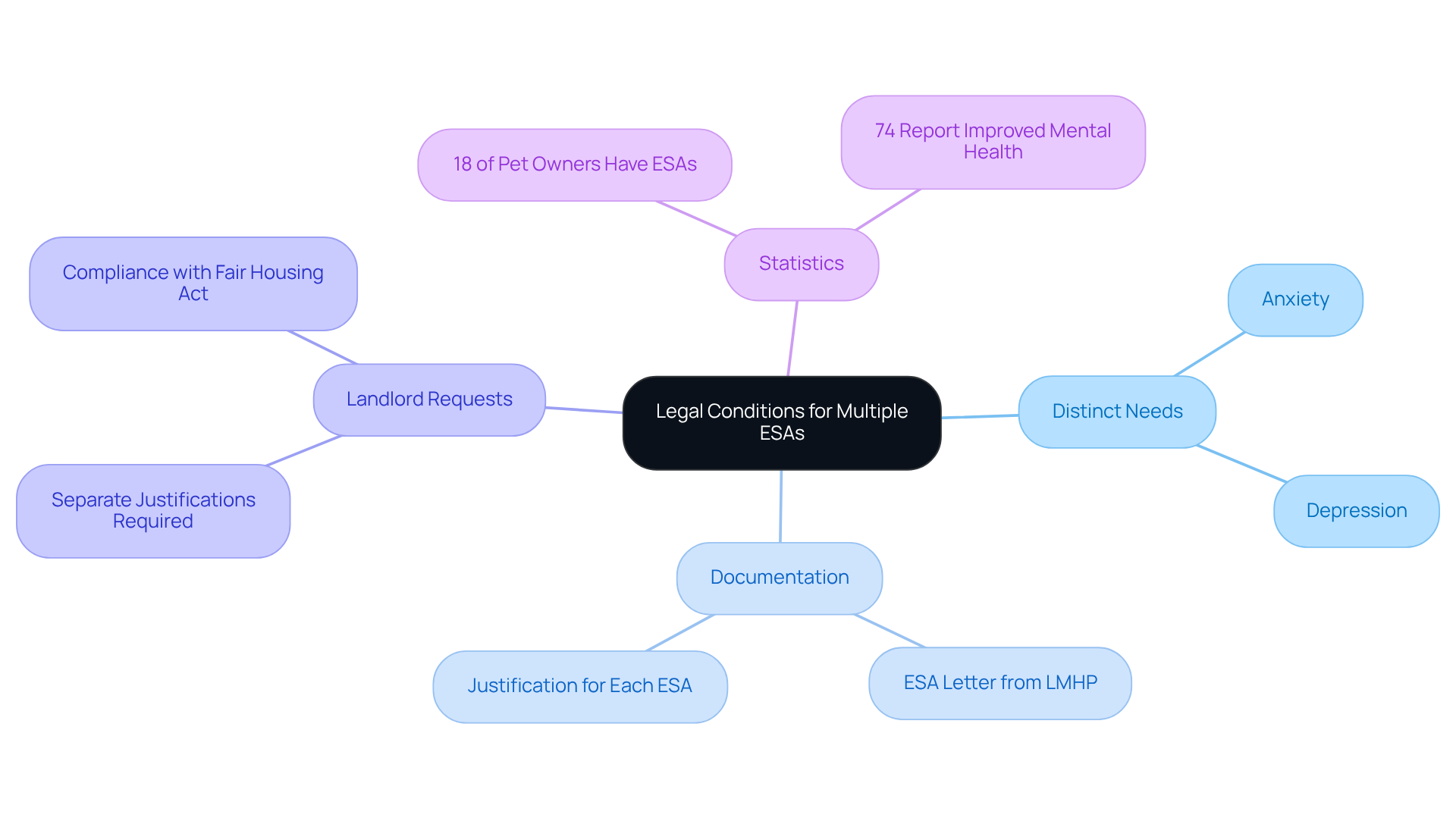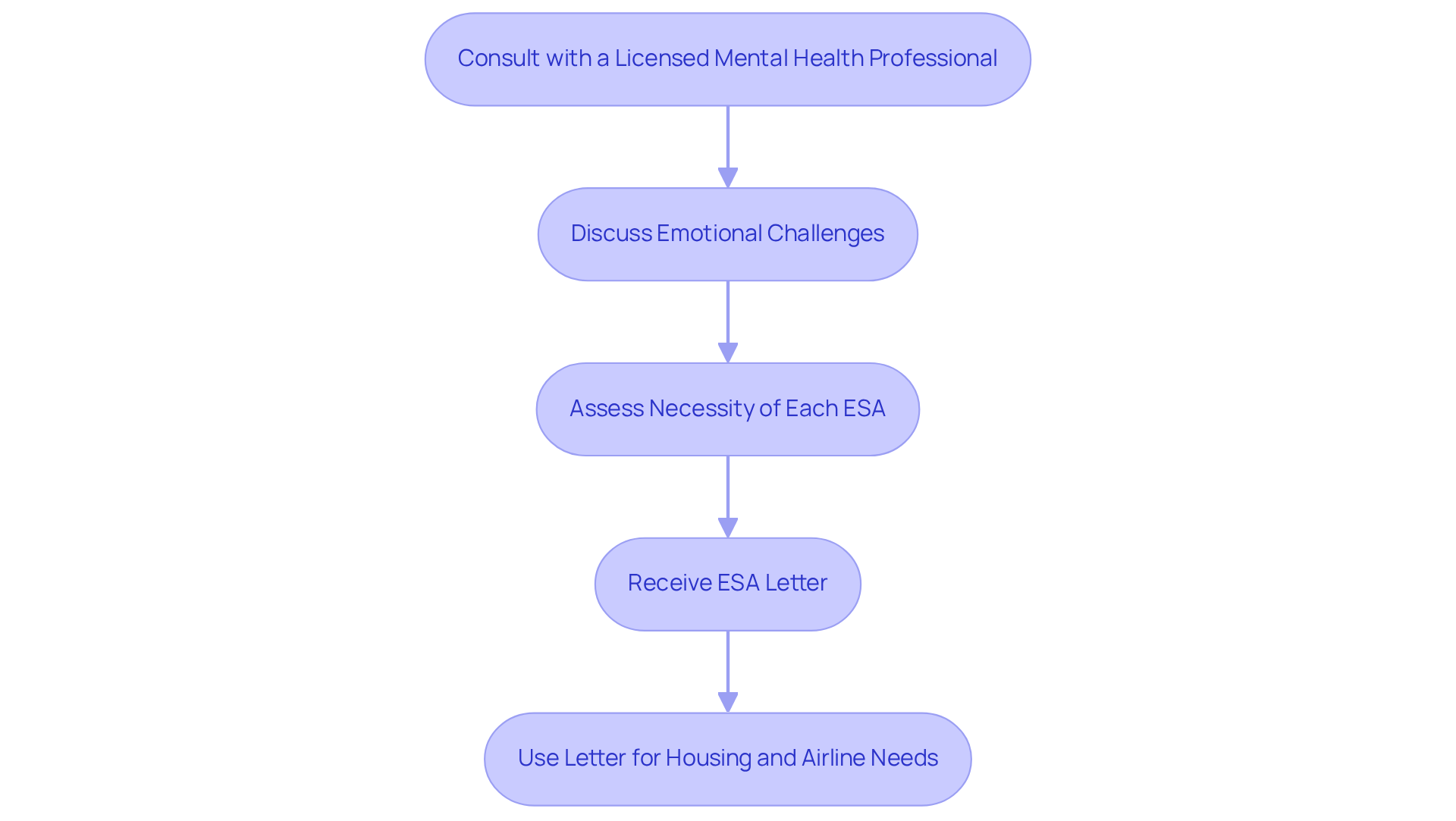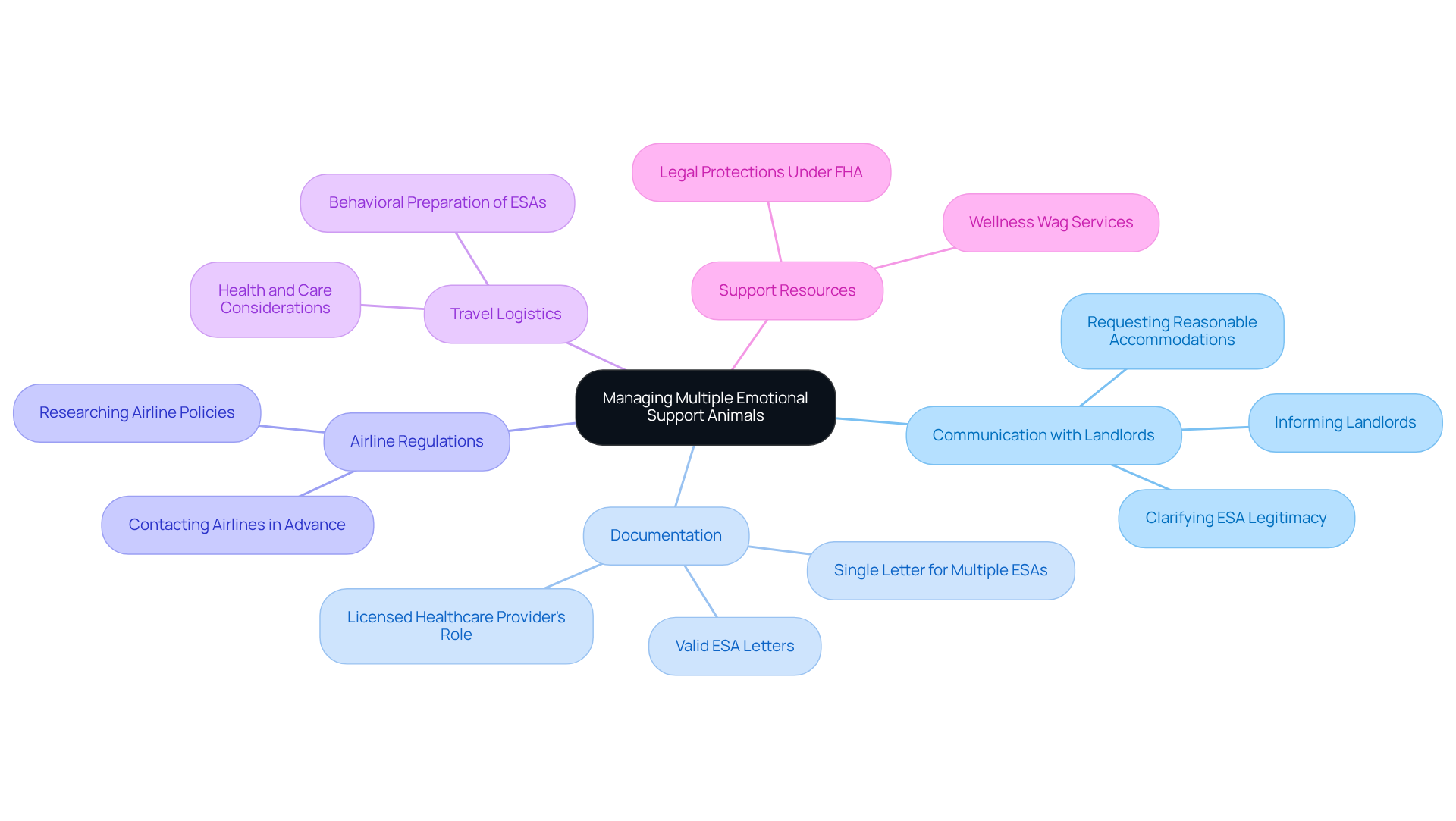

Can You Have More Than One ESA? Essential Steps to Follow
by Lena Park
Last updated: August 5, 2025
Verified and Approved by:
Angela Morris,
MSW, LCSW
Fact Checked

Overview
Navigating the complexities of mental health can be incredibly challenging, and for many, the support of emotional support animals (ESAs) can make a significant difference. If you find that you have more than one ESA, it’s important to know that each animal can address a distinct disability-related need, provided you have the appropriate documentation from a licensed mental health professional. This not only validates your experience but also affirms the unique role each animal plays in your journey toward healing.
To legally qualify for multiple ESAs, it’s essential that each animal is supported by separate ESA letters. These letters detail the therapeutic roles of each animal, ensuring compliance with housing regulations and safeguarding your rights under the Fair Housing Act. By having this documentation, you can feel secure in your living situation, knowing that your emotional well-being is prioritized.
Remember, you are not alone in this journey. The presence of multiple ESAs can provide a comforting and nurturing environment, helping you to manage your emotional challenges more effectively. Each letter serves as a testament to the support available to you, reinforcing the idea that your needs are valid and worthy of acknowledgment. Take heart in knowing that there are compassionate solutions designed to support your emotional journey.
Introduction
Navigating the complexities of emotional support animals (ESAs) can feel overwhelming, particularly for those seeking solace and companionship on their journey toward mental wellness. As the recognition of these vital companions grows, many wonder: can individuals have more than one ESA? This article explores the legal framework surrounding multiple emotional support animals, offering insights into the necessary steps to ensure compliance while maximizing the therapeutic benefits each pet can provide.
With increasing awareness and evolving regulations, it becomes essential to understand the nuances of having multiple ESAs. What challenges might arise, and how can one effectively advocate for their rights? Your journey is important, and support is available every step of the way.
Understand the Legal Definition of Emotional Support Animals
Emotional support creatures play a vital role in providing comfort and assistance to individuals navigating the challenges of mental health issues. Unlike assistance animals, emotional support pets do not require specialized training to perform specific tasks. Under the Fair Housing Act (FHA) and the Air Carrier Access Act (ACAA), these beloved companions are recognized as essential for individuals with disabilities, enabling them to reside in accommodations that may otherwise impose pet restrictions.
To ensure that an emotional support animal is truly beneficial, it is important that each creature is deemed necessary for your emotional well-being by a licensed mental health professional. This evaluation is crucial in validating your need for more than one ESA, addressing the question of can you have more than one esa, and ensuring that you meet legal standards while having access to housing and travel accommodations that support your journey.
It’s important to understand that misrepresenting pets as emotional support animals can jeopardize the accommodations available to those with genuine needs. The American Kennel Club emphasizes the importance of maintaining the integrity of emotional support animal provisions, reminding us that honesty is key in preserving these vital resources.
With over 50,000 patients assisted by Wellness Wag, the role of licensed professionals in assessing the necessity for emotional support animals is underscored. This highlights the significance of appropriate documentation and thorough evaluation in this process, ensuring that individuals receive the support they truly deserve. Remember, you are not alone on this journey, and there are compassionate resources available to help you find the comfort and companionship you seek.

Identify Legal Conditions for Having Multiple ESAs
To qualify for several emotional support animals (ESAs), each must address a distinct disability-related need. The U.S. Department of Housing and Urban Development (HUD) confirms that when asking, ‘can you have more than one esa?’, the answer is yes, provided that each animal plays a unique role in alleviating the individual’s emotional distress. As Logan Miller aptly puts it, “To officially recognize an animal as an ESA, the owner needs to obtain an ESA letter issued by a licensed mental health professional (LMHP).” This documentation is crucial, as it must articulate the necessity for each ESA, especially when making accommodation requests to landlords or airlines.
Statistics reveal that approximately 18% of pet owners in the U.S. have emotional support animals, with many households caring for multiple pets. For example, a household might question, can you have more than one esa to help manage anxiety and another to assist with symptoms of depression. This differentiation is essential, as each ESA must be justified by independent disability-related reasons. Recent HUD guidance highlights that landlords can require separate justifications for each ESA, emphasizing the importance of clear documentation. A recent ruling by the Tennessee Human Rights Commission (THRC) affirmed that landlords can indeed request distinct reasons for each ESA, underscoring the significance of understanding these legal conditions.
Understanding these legal conditions is vital for individuals who want to know if they can have more than one ESA to seek therapeutic benefits. It ensures compliance with housing regulations while empowering them to advocate for their rights under the Fair Housing Act. Remember, you are not alone in this journey; support is available to help you navigate the complexities of emotional support animals.

Obtain Valid ESA Letters for Each Animal
Navigating the complexities of mental health can be incredibly challenging, and for many, the presence of emotional support animals (ESAs) can make a world of difference. To obtain valid ESA letters for each pet, it is essential to consult with a licensed mental health professional who can assess your specific needs. During this consultation, openly discuss your emotional challenges and how each creature contributes to your overall well-being. If the professional concludes that each creature is necessary, they will issue an ESA letter for each one. These letters must include the professional’s credentials, your diagnosis, and a clear statement outlining the necessity of each ESA.
As noted by ESA Doctors, you can have more than one ESA if each is covered by your ESA letter. This documentation is vital for housing providers and airlines to recognize your rights, as federal laws acknowledge the necessity for reasonable accommodations concerning emotional support creatures. The process may feel daunting, but remember that you are not alone—many individuals have found comfort and support through their ESAs.
Additionally, Wellness Wag provides ESA letters within 24 hours of approval, ensuring timely support when you need it most. Well-prepared ESA letters not only facilitate easier dealings with property owners and travel officials but also strengthen the validity of your appeal regarding whether you can have more than one ESA. Imagine the relief of having the proper documentation in hand, allowing you to focus on what truly matters: your well-being and the companionship of your beloved pets.
Furthermore, Wellness Wag offers a money-back guarantee, underscoring their commitment to customer satisfaction. This assurance can provide peace of mind, knowing that you have a reliable partner in your journey toward emotional wellness. Remember, the support you seek is within reach, and with the right resources, you can create a nurturing environment for both yourself and your furry friends.

Manage Multiple ESAs in Housing and Travel
Managing various emotional support creatures can be a challenging journey, requiring effective communication with both landlords and travel authorities. It’s important to start by informing your landlord about your need for multiple emotional support animals, especially when considering if can you have more than one ESA, and providing the necessary documentation that outlines how each pet contributes to your mental well-being.
Articulating the unique therapeutic role of each ESA is crucial, as it can lead to a more seamless approval process. While there is no federal limit on the number of emotional support animals you can have, it raises the question: can you have more than one ESA, and landlords may request a valid ESA letter for each pet to confirm their legitimacy. It’s also reassuring to know that landlords cannot impose charges or deposits for emotional support animals, even if you have several, which serves as a significant legal protection under the Fair Housing Act (FHA).
Additionally, familiarizing yourself with the specific airline regulations regarding emotional support animals is essential, as these can differ widely. With approximately 18% of pet owners in the U.S. having emotional support animals, awareness of their benefits is increasing, potentially influencing airline policies in a positive direction.
When you travel, it’s vital to ensure that each ESA is well-behaved and accustomed to the travel environment. This helps minimize disruptions and creates a more pleasant experience for everyone involved. Consider the logistics of caring for multiple animals, including their health, exercise, and emotional needs, to maintain a harmonious living situation.
Remember, effective communication and thoughtful preparation are key to navigating the complexities of having multiple ESAs, especially when considering can you have more than one ESA in both housing and travel scenarios. You are not alone in this journey; support is available to help you thrive with your beloved companions.

Conclusion
Understanding the complexities surrounding emotional support animals (ESAs) is essential for individuals seeking comfort and companionship through their pets. Many people face emotional challenges that can feel overwhelming, and the presence of an ESA can provide significant relief. It is indeed possible to have more than one ESA, provided that each animal serves a distinct purpose in alleviating emotional distress. This legal framework is supported by the Fair Housing Act and the Air Carrier Access Act, which recognize the importance of these animals in the lives of those with disabilities.
To navigate this journey, it is crucial to obtain valid ESA letters from licensed mental health professionals for each animal. This documentation not only affirms the need for emotional support but also ensures compliance with housing regulations and advocacy for rights. Clear communication with landlords and travel authorities is vital, as each ESA must be justified by an independent disability-related reason. Have you considered how these steps can empower you in your journey?
Ultimately, managing multiple emotional support animals can be rewarding, yet it requires diligence and preparation. Individuals are encouraged to seek the necessary resources, including professional evaluations and proper documentation, to navigate this process successfully. By understanding the legal landscape and taking proactive steps, those in need can create a nurturing environment that fosters emotional well-being and companionship with their beloved pets. Remember, you are not alone in this journey; support is available, and taking these steps can lead to a fulfilling bond with your ESAs.
Frequently Asked Questions
What is the legal definition of emotional support animals (ESAs)?
Emotional support animals are pets that provide comfort and assistance to individuals with mental health issues. They do not require specialized training to perform specific tasks and are recognized under the Fair Housing Act (FHA) and the Air Carrier Access Act (ACAA) as essential for individuals with disabilities.
Do emotional support animals require special training?
No, emotional support animals do not require specialized training to perform specific tasks.
How does one qualify for an emotional support animal?
To qualify for an emotional support animal, an individual must receive an evaluation from a licensed mental health professional who deems the animal necessary for their emotional well-being.
Can a person have more than one emotional support animal?
Yes, a licensed mental health professional can validate the need for more than one emotional support animal based on the individual’s circumstances.
What are the consequences of misrepresenting a pet as an emotional support animal?
Misrepresenting pets as emotional support animals can jeopardize the accommodations available to those with genuine needs, potentially harming the integrity of emotional support animal provisions.
Why is documentation important for emotional support animals?
Appropriate documentation is crucial to validate the necessity for emotional support animals and to ensure that individuals have access to housing and travel accommodations that support their needs.
What resources are available for individuals seeking emotional support animals?
There are compassionate resources, including licensed professionals, available to help individuals find the comfort and companionship they seek through emotional support animals.
Certify Your Emotional Support Animal Today

Why You Can Rely on Us?
At Wellness Wag, we believe your pet deserves care rooted in both science and compassion. Each article is carefully researched, written in clear language for pet owners, and then reviewed by qualified professionals to ensure the information is evidence-based, current, and practical for real-life care. Our goal is to help you feel confident in making informed decisions about your pet’s health and well-being.
Reviewed by
Angela Morris, MSW, LCSW
Angela is a licensed clinical social worker with 20 years of experience in patient advocacy and community mental health. She has assisted numerous clients with ESA evaluations and brings a deep understanding of disability accommodations, ensuring that all information is accurate, supportive, and practical.

Written by :
Lena Park
Last Updated :
August 5, 2025












